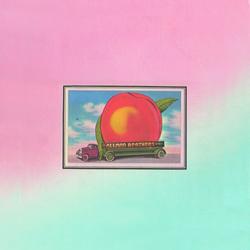Brothers And Sisters - The Allman Brothers Band
$ 3.99 – $ 4.99
Released a year after Eat a Peach, Brothers and Sisters shows off a leaner brand of musicianship, which, coupled with a pair of serious crowd-pleasers, "Ramblin' Man" and "Jessica," helped drive it to the top of the charts for a month and a half and to platinum record sales.
This was the first album to feature the group's new lineup, with Chuck Leavell on keyboards and Lamar Williams on bass, as well as Dickey Betts' emergence as a singer alongside Gregg Allman.
The tracks appear on the album in the order in which they were recorded, and the first three, up through "Ramblin' Man," feature Berry Oakley -- their sound is rock-hard and crisp.
The subsequent songs with Williams have the bass buried in the mix, and an overall muddier sound.
The interplay between Leavell and Betts is beautiful on some songs, and Betts' slide on "Pony Boy" is a dazzling showcase that surprised everybody.
Despite its sales, Brothers and Sisters is not quite a classic album (although it was their best for the next 17 years), especially in the wake of the four that had appeared previously, but it served as a template for some killer stage performances, and it proved that the band could survive the deaths of two key members.
| Title/Composers | Performer | Listen | Time | Size | Size | |
|---|---|---|---|---|---|---|
| 1 | Wasted WordsGregg Allman | The Allman Brothers Band | Play | 04:20 | 9 MB | 27 MB |
| 2 | Ramblin' ManDickey Betts | The Allman Brothers Band | Play | 04:48 | 10 MB | 30 MB |
| 3 | Come and Go BluesGregg Allman | The Allman Brothers Band | Play | 04:55 | 11 MB | 31 MB |
| 4 | Jelly, JellyGregg Allman | The Allman Brothers Band | Play | 05:46 | 13 MB | 32 MB |
| 5 | SouthboundDickey Betts, Richard Betts | The Allman Brothers Band | Play | 05:10 | 11 MB | 36 MB |
| 6 | JessicaDickey Betts, Richard Betts | The Allman Brothers Band | Play | 07:31 | 17 MB | 53 MB |
| 7 | Pony BoyDickey Betts | The Allman Brothers Band | Play | 05:51 | 13 MB | 29 MB |
| 38 mins | 87 MB | |||||
| 38 mins | 241 MB | |||||
| Artist | Job | |
|---|---|---|
| 1 | The Allman Brothers Band | Audio Production, Guitar (Rhythm), Organ, Primary Artist, Producer, Vocals, Vocals (Background) |
| 2 | Gregg Allman | Composer, Guitar, Guitar (Rhythm), Keyboards, Member of Attributed Artist, Organ, Vocals |
| 3 | Dickey Betts | Composer, Dobro, Guitar, Guitar (Electric), Member of Attributed Artist, Slide Guitar, Vocals |
| 4 | Richard Betts | Composer, Dobro, Guitar, Slide Guitar, Vocals |
| 5 | Les Dudek | Guest Artist, Guitar, Guitar (Acoustic) |
| 6 | Jaimoe | Congas, Drums, Member of Attributed Artist, Percussion |
| 7 | Chuck Leavell | Keyboards, Member of Attributed Artist, Piano, Piano (Electric), Synthesizer, Vocals, Vocals (Background) |
| 8 | Berry Oakley | Bass, Bass Instrument, Member of Attributed Artist |
| 9 | Johnny Sandlin | Audio Production, Engineer, Producer |
| 10 | Ovie Sparks | Engineer |
| 11 | Tommy Talton | Guitar (Acoustic) |
| 12 | Buddy Thornton | Engineer |
| 13 | Butch Trucks | Congas, Drums, Member of Attributed Artist, Percussion, Timpani |
| 14 | Lamar Williams | Bass, Bass Instrument, Member of Attributed Artist |
The Allman Brothers Band
| Quality | Format | Encoding | Description |
|---|---|---|---|
| Standard | MP3 | 320kps 44.1kHz | MP3 is an audio coding format which uses a form of lossy data compression. The highest bitrate of this format is 320kbps (kbit/s). MP3 Digital audio takes less amount of space (up to 90% reduction in size) and the quality is not as good as the original one. |







